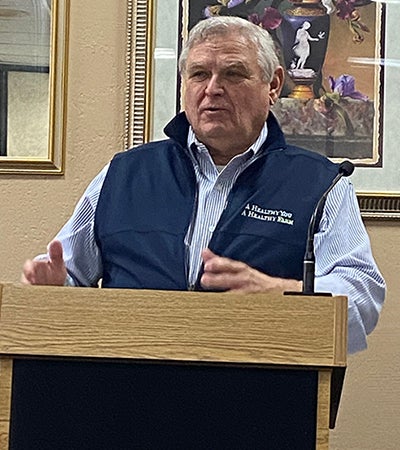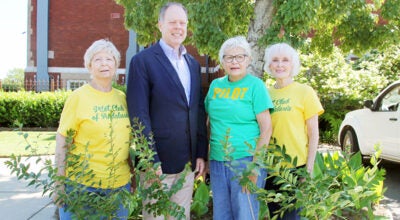Ag Director speaks on egg prices at Andalusia Rotary
Published 9:15 am Monday, February 6, 2023
|
Getting your Trinity Audio player ready...
|
State of Alabama Ag Commissioner Rick Pate talked chickens and eggs with the Andalusia Rotary Club on Tuesday.

State of Alabama Ag Commissioner Rick Pate spoke to members of the Andalusia Rotary Club about the increase in egg production on Tuesday, Jan. 31. (SUBMITTED PHOTO)
Pate, who hails from Lownesboro, said the increase in egg costs in the past year is directly attributable to avian influenza, adding that Alabama’s poultry industry was largely unaffected by 2022’s two waves of the deadly virus.
“We’ve always had it (around),” he said. “It circulates in wood ducks and other fowl, but the public doesn’t want us to get rid of those.
There’s lots of biosecurity in the poultry industry, Pate said. Nonetheless, last year, the virus “got loose,” first in wild ducks.
“We had a backyard flock in Moulton that started dying,” he said. “We tested them and it turned out they had high pathogens for avian influenza.”
Alabama is second in the nation in broiler production, Pate said, but much lower in table egg production.
“That’s mostly in Kentucky, Ohio and Indiana,” he said. “We have hardly any in it here.”
Laying hens are housed in larger numbers than broilers.
“If we have a problem (in Alabama), we come in, depopulate it in minutes and incinerate the dead birds. There might be fifteen to twenty thousand birds in it.”
But he cited a recent outbreak in an egg-producing state in which more than a million chickens were depopulated.
The USDA estimates that 43 million birds were depopulated nationwide in the effort to control the spread of the virus. By December of 2022, U.S. egg inventories were 29 percent lower in the final week of December 2022 than at the beginning of the year. Prices were 210 percent higher, according to USDA.
“It was just like the COVID toilet tissue disaster,” Pate said. “We could have retooled and kept production up. But we knew demand would plummet at some point.”
“We anticipate egg prices will keep going up until Easter, because they always do, but then they’ll go down,” he said.
There’s been almost no avian influenza in Alabama’s broiler population, he said. But state farmers have still heightened security to keep the disease at bay. Alabama poultry farmers process 23 million birds a week, he said.
The Great Chicken Rescue
Speaking of chickens, Pate said the Department of Ag and Industries has also been called upon to deal with fighting chickens.
“In Alabama, it’s illegal to fight chickens, and it should be,” he said. “But it’s not illegal to raise and sell fight chickens. In some parts of the state, they do fight them, and it’s illegal to gamble on it. But we don’t have guns and badges, so it’s not our problem.”
Until it is.
Pate recalled receiving a call from the Department of Justice informing the department that the U.S. Marshals wanted them to depopulate a cock fighting operation after it was busted.
“Actually, we call them avian athletes, because it sounds more respectable,” Pate said. “So the DOJ wanted us to send a crew after they arrested them all.
“But they had not anticipated that the owner was the richest guy in the county,” Pate said. “He gets a lawyer and tries to get a federal court to give him a stay so he can keep his 1,500 avian athletes.
“DOJ didn’t want the birds, and we didn’t want them, so the judge said, ‘OK, 30 days. You keep them.’ “
Days later, the Ag Department was poised for a second trip when Pate received a call at home from his counterpart in Vermont. The ag commissioner there was calling to inquire about the ‘avian athletes.’
“We can’t let you execute those beautiful chickens,” he told Pate. “We’ve got a vegetarian group that wants to adopt them and rehab them.”
Pate told them to come on down and get all they wanted.
A rescuer drove approximately 1,100 miles, and arrived with several large cages, Pate recalled.
“He was planning to put seven or eight birds in a cage,” he said.
Pate had to explain to him that while he was welcome to take the birds, but the time he got back to Vermont, there’d only be one living bird in each cage.
The accused got a second 30-day stay, and was selling the birds as fast as he could. By the time the stay expired, he had sold most of them.
Eventually, Pate said, the Vermont rescuer transported 100 birds north.
“Last time I checked, the commissioner up there said the chickens we doing splendid and being rehabbed. We hope they have long and fruitful lives.”
Eat Local
Pate also talked about an initiative begun in his first term encouraging Alabama school systems to use Alabama products in school lunches.
Using a Minnesota program as a model, the Department secured state funding that it used as incentives, granting a school system 25 cents for every item of local food it served.
The first year, he said, the initiative caused more than a half-million servings of Alabama-grown food to be served in schools. The program has increased in subsequent years, he said, but was implemented by affluent school systems.
Rural school children now also get more locally-grown food, he said, thanks to a federal program.
“The president decided he wanted to help farmers,” Pate said. “So we got $4 million to use to buy local food in underserved counties. We were able to go back and help those students, and it was a great boon for Alabama farmers.”
The federal program also allows gifts to food banks.
Pate was the guest of Andalusia Rotarian Baynard Ward.




